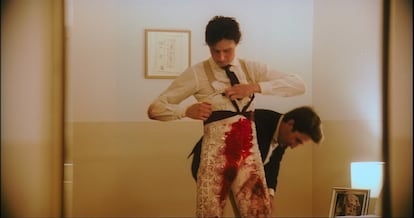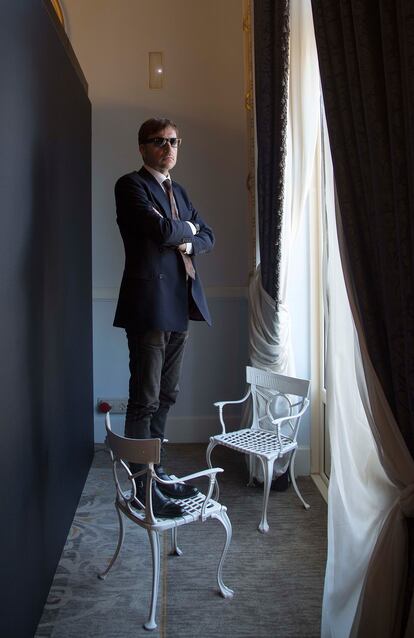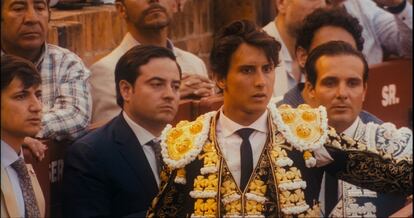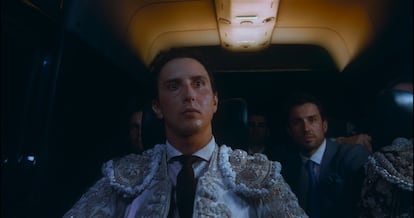Without having seen it almost anyone, the documentary Afternoons of solitude It was already the scandal film of this year’s San Sebastian festival, from the moment its selection in the Zinemaldia competition was announced. Until now, its author, Albert Serra (Banyoles, 48 years old), had been causing a scandal with his statements. Afternoons of solitude He already carries it for himself: For three years he has filmed various bullfights by matadors Andrés Roca Rey and Pablo Aguado. And few subjects are as radical as bullfighting for Spaniards.
The film was ready last Saturday night, and in the final cut the parallelism between the two right-handers has disappeared, because the length was excessive. The director of Pacifiction He has left out Aguado (“Although I will work with his images in another project”), has focused on the Peruvian Roca Rey and has achieved the squaring of the circle: the documentary can be liked or hated by both sides. Because on screen there is blood, death throes, agonies of animals and at the same time the cameras accompany the bullfighter in an intimate way in his work, and in moments before and after, such as when he puts on the suit of lights or the comings and goings with his team to the bullrings in a minibus. These sequences will be the most attractive for bullfighting fans, because in addition some of his subordinates speak, remembers the director, “for example, that the master has killed the bull with complete truth.”
Serra defines himself as a pro-bullfighter. “But when you make a film,” he says, “you can’t adopt any point of view because you mediate the product. My obsession as a creator is to look for unpublished images, to avoid clichés. From here on, my opinion has no importance. It was useful because I know a bit about bullfighting, and I could guide myself. However, the objective was to get to the bottom of the matter, to look for interesting things with the operators. Of what order? I didn’t care, but it had to be interesting.”
Afternoons of solitude It is a commission, because Serra had never made a documentary before. “A friend (Jordi Batlló) from the documentary master’s degree at Pompeu Fabra asked me for it for years and finally when I found a topic that interested me, I did it.” A regular at the Cannes festival, this is the first time he has competed in San Sebastian and the film will be released in France before it is released in Spain. In addition, fifteen festivals have already requested its screening: “Look, for example, at the New York festival, where Pedro Almodóvar and I are going. They are all waiting for the film. There is not so much fuss about bullfighting abroad, perhaps because they see it from a more anthropological point of view.”

Why has bullfighting been shown so little in Spanish cinema? “Because it was impossible. Only now have we achieved the appropriate technology, such as wireless microphones with five-hour batteries. Everything before has been too schematic or superficial. Or grotesque. With these cameras, with this search for something interesting, at least we find something. In the end, reality doesn’t matter to me. I am interested when the images of the bullfight, of Roca Rey and his team, make the spectator end up a little hypnotized. When the image provokes fantasy and makes one dream.”
At the same time, Serra does not avoid a moment of cruelty in his bullfights. “It is part of it. Showing this balance was necessary. To me, this death, which causes a lot of controversy, seems poetic. Look, the bull does not know that he is going to die, he does not know what death is and he does not know that he is dying. We teach that life is slipping away from him, without ideas of perversity. I think that this connects a lot with what the team tells him: life is worthless in itself if you do not take advantage of it to do great things.”

Roca Rey appears as a totem: silent, focused on his destiny, while his team and assistants idolize him and never stop talking to him. “They say these things so… I don’t know, like he fights ‘with the absolute truth’, phrases that are so poetic and excessive…” Serra laughs. “Roca Rey has something so introspective and so mysterious that it fascinates cinematically.”
What does Serra think of the protests by Podemos Euskadi before the premiere at the festival or by Pacma Gipuzkoa last week asking for the screening to be withdrawn? “Well, they haven’t seen it… Besides, it’s a work of art, I don’t know what’s wrong with them. They protest against social injustice, the problems in the streets, but not against a work of art. And yes, bullfights are like that. Like wars. How can Ukraine resist Russia? Well, by killing, what do we expect? And thousands of people have died. We live surrounded by subterfuge, and death is part of the life cycle. I don’t know, maybe we live in some places in such a comfortable way that we forget…” Serra has always been bothered by the current Disney-ification of reality. “I don’t like conflict. Really. I like fluidity and harmony with people and that everyone understands each other. But not everything is worth it. Just because you deny the existence of something, it’s not going to disappear as if by magic. And bullfighting has a symbolic value… Hey, if people don’t like bulls, then they should propose a change… Anyway, it’s that current trivialization, and for once there is something more complex, worthy of debate, back to simplification. And yes, if there was a vote on bullfighting, I would vote in favor.”

In these years, which have ended with a long and complicated assembly, a process in which it was born Afternoons of solitude, As is usual with Serra —“I came from a similar process with Pacifiction “I got into the same mess, I’m exhausted, only I do something like this in Spain”—, what has the filmmaker discovered in bullfighting that he didn’t know about? “The commitment of the bullfighters and their subordinates to their art. And their courage. This word is not very fashionable, but sometimes it takes a lot of courage to undertake certain actions. Their courage. Seeing it up close impressed me. Oh! And in a world of envy, fueled by social networks, I was fascinated by the camaraderie between them. The team only cares about one thing: helping the master and the rest of his colleagues.”

